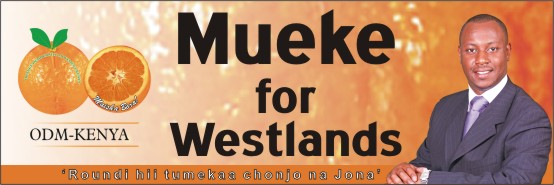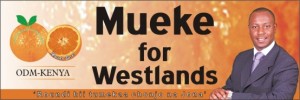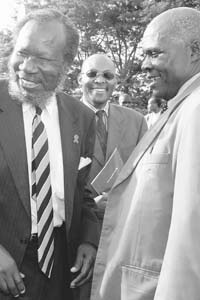I have met a few MP’s, watched several live debates in the last parliament, and lot’s of TV over the last five years. What is shocking to me is how different an MP that you know is – almost a two-faced person who’s a serious level-headed professional debater in private who schmoozes the private sector and donors in person, and yet gets on TV at a rally and talks like a Neanderthal, insulting opponents from far flung places around the country.
The MP’s in the outing parliament who impressed me (yet I don’t know any of them personally ) – are people who were always in parliament, debating and active in legislative matters – these include Maoka Maore, Justin Muturi, Martha Karua, Njoki Ndungu, Wafula Wamunyinyi to name a few.
Yet many of them will not be back next March. For every professional i.e banker, farmer, stockbroker, accountant, IT specialist or other professional like Jonathan Mueke who take a first time plunge to make a difference, there are other perennial candidates that they have to run against – and however Jonathan turns out, he’s likely to be better than several other candidates who include folk like;
Current MP’s: best illustrated with quotes from Joseph Kamotho and Norman Nyagah who after losing party nominations and defecting to new parties – said I must be on the ballot and my constituents love me and I must reciprocate that by continuing to serve them.
ex-MP who feel the cold of being out of parliament. But like a gambler the morning after a big-loss night out, they think they know what they did wrong, set about scraping resources to make another lucky run the next night at the casino of parliament. In real life, they still call themselves ‘honorable,’ watch their dwindling money, as they maintain political and social networks ready for a comeback. And if asked, they are always ready to deny that they are interested in returning to parliament, but the lure is too easy and they are a sure bit to be in the ‘right party’ come election time.
Grey MP’s: not Grey in age, but these are people who have some blemished reputations – running from dubious financial escapades at Kenya Posts & telecommunications, health care sector, Goldenberg, road construction, public service, collapsed banks, etc. – who go to parliament where they will work to influence the the Public Investments (PIC) or public accounts (PAC) committees (from within) who investigate 5 year old scandals. They are well funded, know how to play (dirty) tricks, and buy their way into cash hungry political parties – since going into politics after a scandal ridden period provides a re-birth of sorts that legitimizes someone who perhaps should be a defendant, not a ‘honorable MP’
And once a professional gets to parliament does it matter how they perform as legislators? Maore, Muturi, and Muriuki Karue (who introduced the game changing constituency development fund scheme in 2003) have been voted out of parliament by their constituents this year. The CDF was a good measure of how MP’s handled public money as a measure of how an outgoing MP has performed, but I’m sure there are hardworking development minded MP’s (e.g. Tuju) who will be voted out for reasons other than addressing and improving the welfare of their constituents.
So by what measure, should we judge our parliamentarians? Many are judged by the handouts they give or how many constituents they can stuff into the bloated government workforce over the five years they are in office. It is wrong, but until the expectations of constituents change, we will remain stuck with the same old folks. Or, as the 2002 – 2007 period showed, you may vote in new cheetah’s but they will be old hippos that the same constituents will happily vote out & cheer away five years later.
Random post election questions
– does a president who loses an election remain eligible for the handsome 2002 presidential retirement package if he remains in active politics?
– how many bank loans are likely to be recalled or go bad, given the high number of MP’s (likely to be 50%) thrown out by constituents this week?


